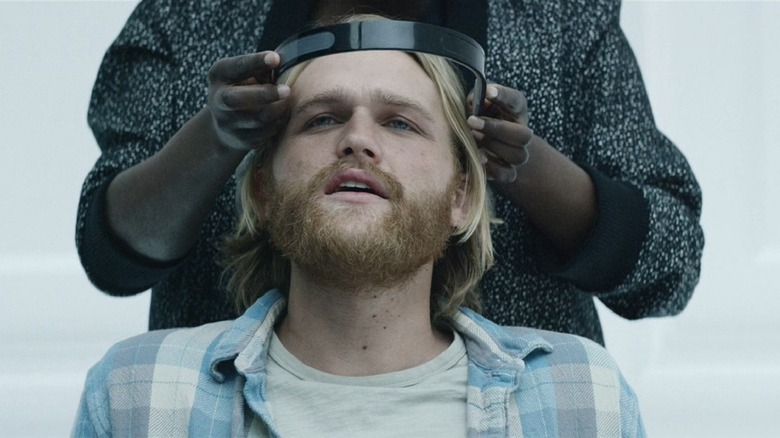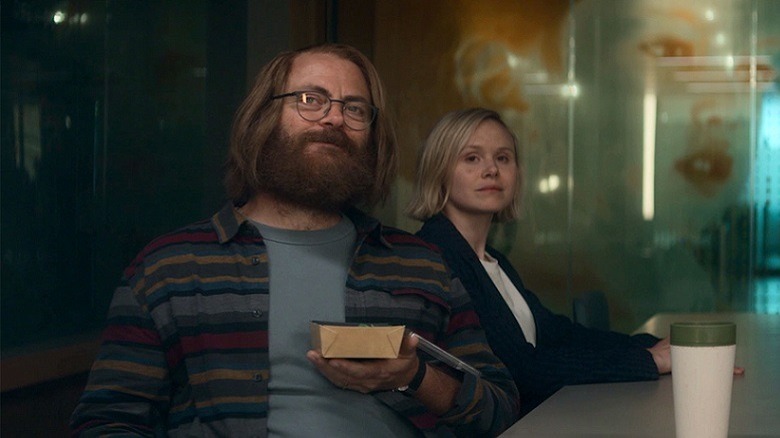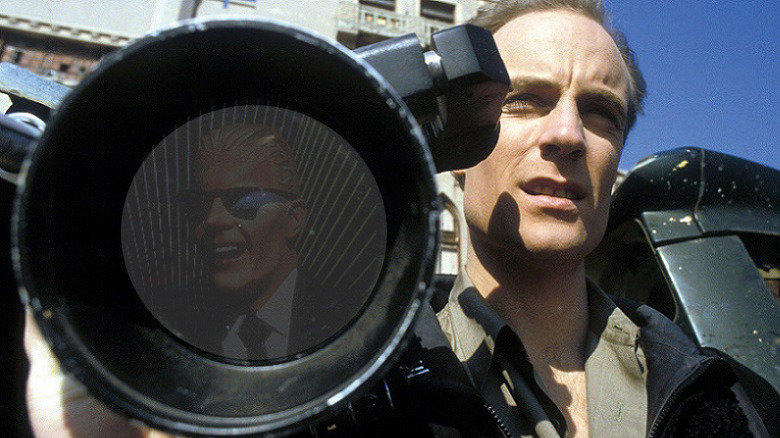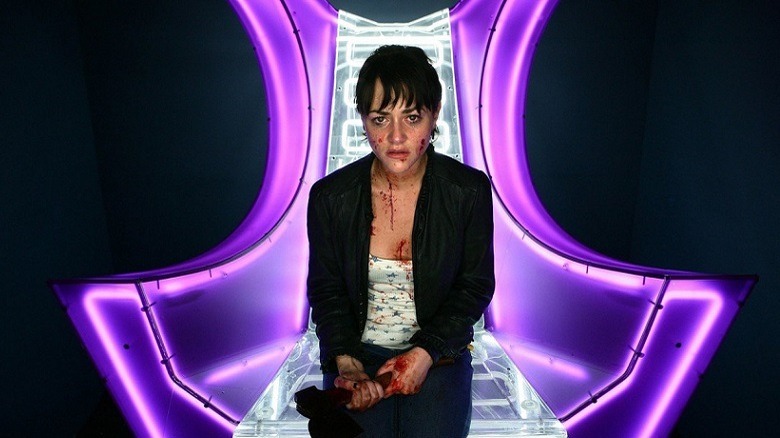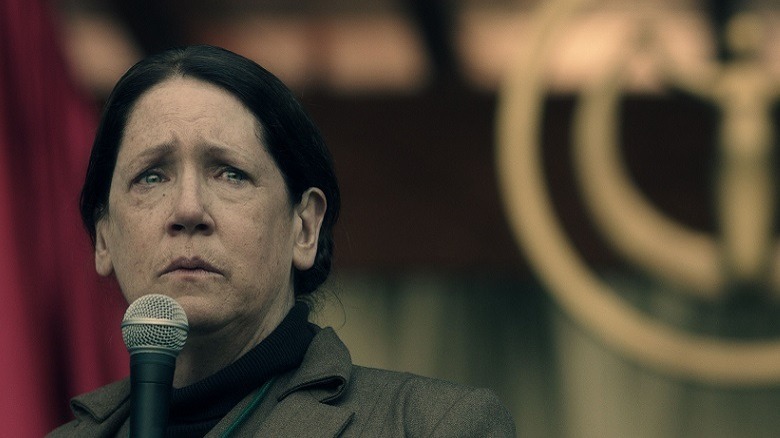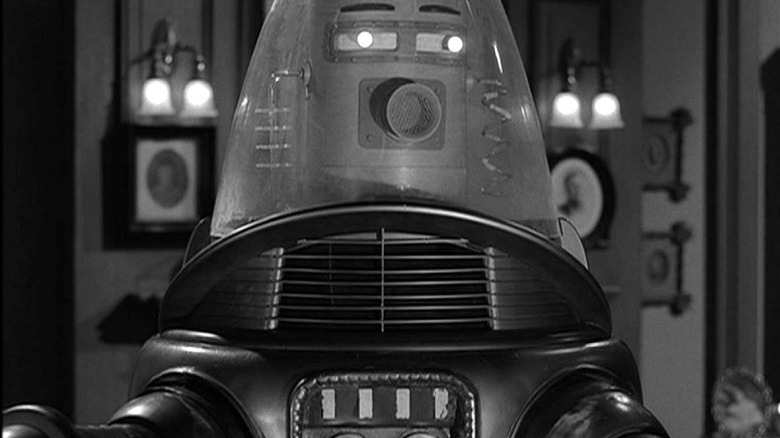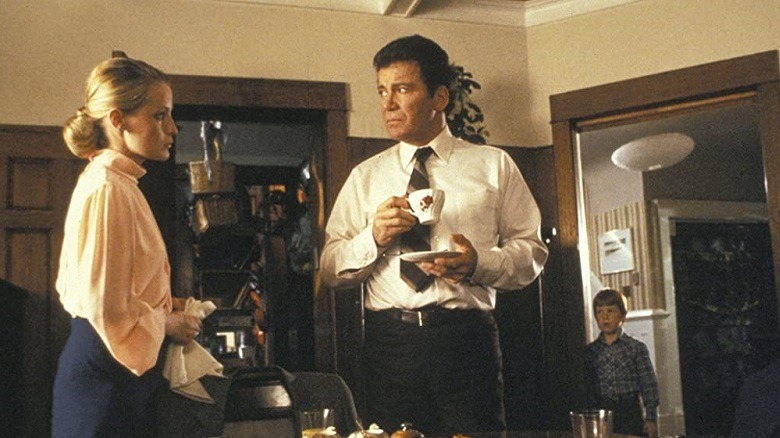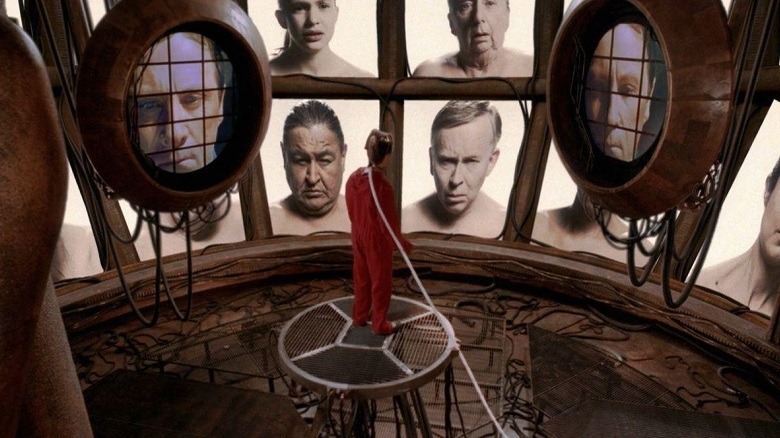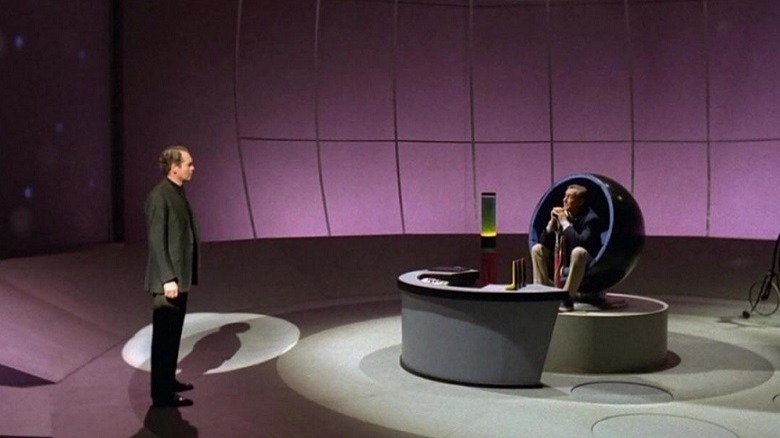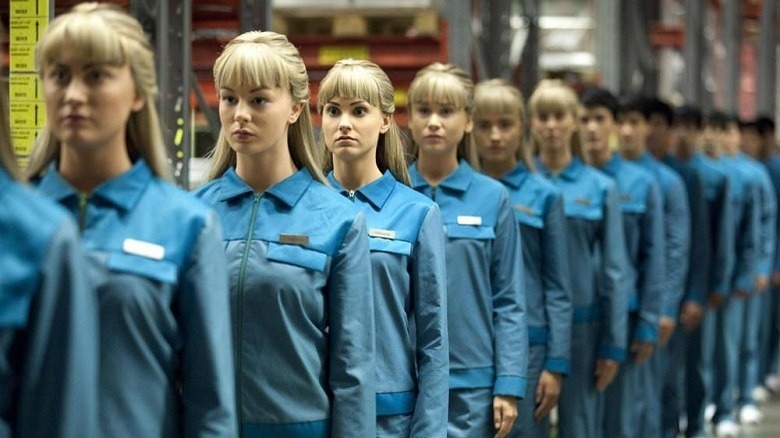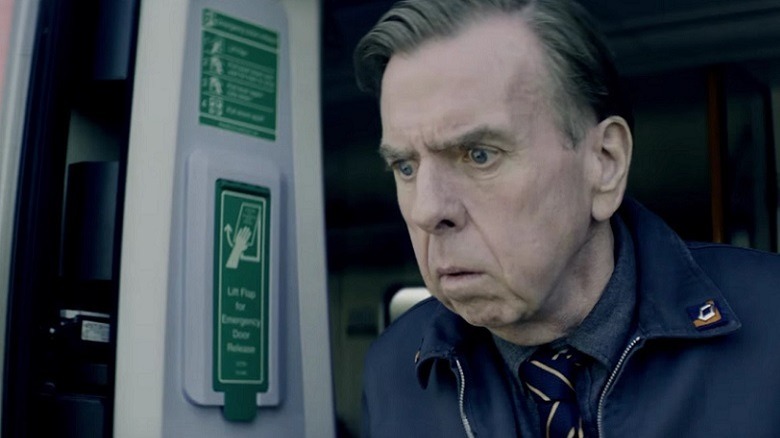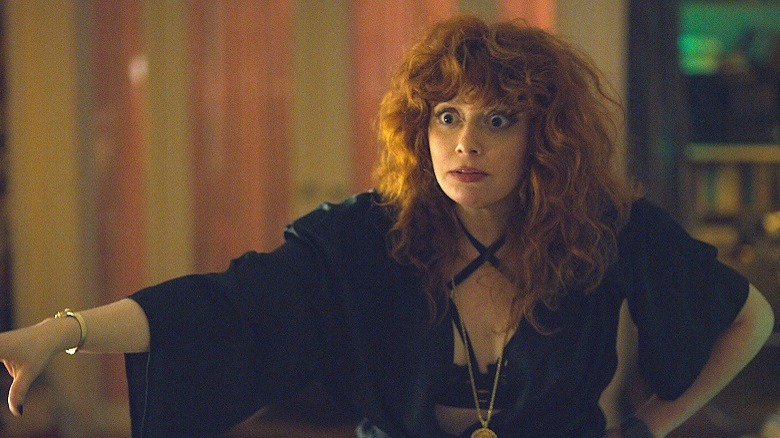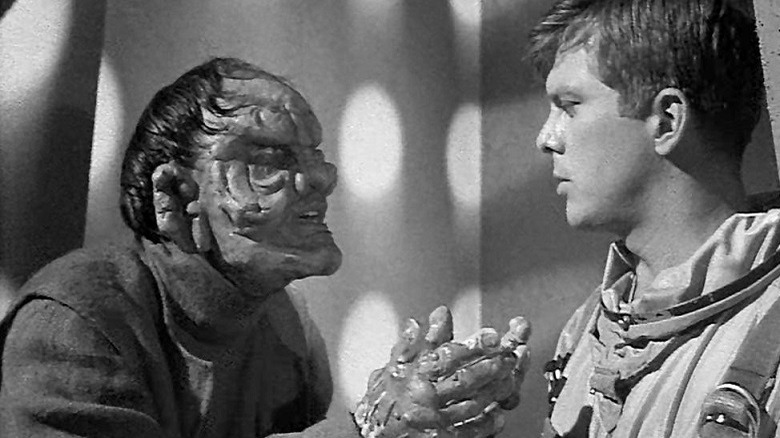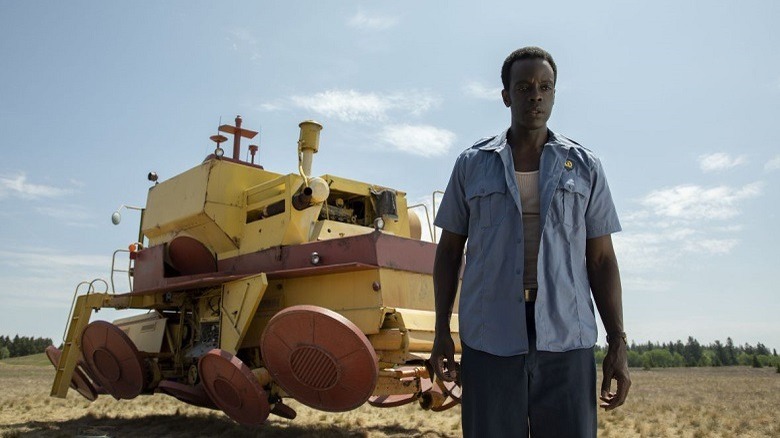Shows Like Black Mirror That Are Definitely Worth Watching
Technology is bad, mmmkay? Oh, you might be perfectly content with Alexa/Siri/HAL 9000 reminding you of your kid's birthdays or granting you the luxury of turning off your bedroom light without having to leave the cozy confines of your bed, but make no mistake — it's planning your downfall.
If it's not conspiring with a military supercomputer to ensure your house is at ground zero of a proposed nuclear strike, it's listening in on your conversations. If you're lucky, that information is only being used for targeted advertising. But, boy, if you're unlucky, it's gathering information so your impending robot duplicate can behave exactly like you. Every quirk, every nuance — even that weird thing you do with your top lip when you're thinking hard about something. They've already discussed your television viewing and eating habits with the Netflix and Just Eat servers at length.
"Black Mirror" may just seem like a television series to you, but to your binary betrayers, it's propaganda material. So, without hesitation, here are 14 similar shows which may be of interest. And if Big Brother/Sister is listening, I for one welcome our cybernetic overlords, and you didn't hear about any of this from me, understood?
Devs
Alex Garland had already proven he could do smart science fiction with the movies "Ex Machina" and "Annihilation," so it was no surprise to find that his television debut "Devs" displayed an equally deft approach to the genre. Following software engineer Lily, whose life is turned upside down when her boyfriend goes missing shortly after starting work with the tech company Amaya. Investigating his absence, she learns that the shadowy Devs division may be responsible and might just well go to any lengths to keep their secrets — even murder.
Writer and director Garland is no stranger to high-concept drama, and the superlative "Devs" is as high concept as to be virtually stratospheric; the concept of a supercomputer powerful enough to not only predict the future — extrapolating based on hacking quantum data — but to see any point from our past. Nick Offerman as Amaya's CEO Forest is as far from Ron Swanson in "Parks and Recreation" as you can get, a tortured (yet somewhat sympathetic) antagonist. It's a big show with lofty ideas, and — despite stumbling slightly in its final act — is a beautifully shot piece of thought-provoking science fiction that's well worth your time, linear or otherwise.
Max Headroom
Those of a certain age will be familiar with the character of Max Headroom, the wise-cracking computer-generated presenter with a joke book as small as his polygon count, stuttering jokes and catchphrases against a spinning wireframe background. The character was even briefly revived as a pensioner in 2007.
Those knowledgeable will be aware Max wasn't computer-generated at all, just actor Matt Frewer under layers of rubber and prosthetics aided by some camera trickery, but a certain few might even remember the character's origin story on UK network Channel 4 back in the mid-'80s. In a plot predating "Black Mirror" but perfectly suited, "Max Headroom: 20 Minutes into the Future" told of an intrepid journalist, Edison Carter, investigating a TV network to find the truth behind controversial subliminal adverts — "blipverts" that were causing people's heads to explode. Fleeing with damning evidence, Edison's hasty motorcycle escape from a multi-story car park was caught short by his collision with a traffic warning sign — marked, of course, "MAX HEADROOM." This 1985 film was made into a series by ABC and ran between 1987 and 1988, taking a lot of the dark humor and satire from the original TV film.
Dead Set
Before Charlie Brooker developed "Black Mirror," he gave us the mini-series "Dead Set" — an equally acerbic and well-observed piece of television, but this time stabbing at reality TV as opposed to technology. It's the sort of idea that sounds like it was either randomly generated or conceived as a dare ("What if zombies got into the Big Brother house?"), but ends up being handled with such flare and panache that it's hard not to love. Brooker's trademark wit abounds, in a houseful of disparate wannabes unaware of the disaster unfolding outside their fenced-off compound.
Using the actual UK Big Brother house — featuring proper hosts and previous guests — is a stroke of genius, elevating it from mere spoof into something that feels terribly familiar and real. In the way that all the best zombie movies work as satire (think: Romero's peerless 1978 "Dawn of the Dead" taking a sly dig at consumerism), "Dead Set" shows that some things are reliable even in the face of the end of the world: TV executives are ruthless, and there are people willing to do anything to be famous for 15 minutes, even if that quarter of an hour ends up being post-apocalyptic.
The Handmaid's Tale
In the '80s, you'd have been forgiven for thinking that nuclear Armageddon seemed not only likely, but inevitable. The radiation-ravaged wasteland was a common trope in dystopias across fiction ("Mad Max" and its sequels), but plenty of writers (Margaret Atwood in "The Handmaids Tale," Ray Bradbury in "Fahrenheit 451," J.G. Ballard in "Children of Men") were bringing us quite different anti-utopias — ones with a world frighteningly similar to our own, but where events had taken a skewed turn. In some cases, you'd almost rather take your chances hunting for fuel and fighting mutants in a desolate wasteland.
"The Handmaid's Tale" is one such dystopia, given a worrying plausibility at times by current events. An environmental disaster dealt with way too late? The exponential and worrying rise of a religious anti-science mindset? Scarily, that doesn't seem all that far-fetched these days. The series, like much of its fellow entries on this list, is bleaker than bleak, but a surprisingly faithful adaptation of the source material. The series itself has now expanded beyond the events of the first novel, with Margaret Atwood's 2019 sequel, "The Testaments," taking place long after the timeline of the Hulu series.
The Twilight Zone
I've waxed lyrical about this groundbreaking series elsewhere on this site, but it clearly serves as the template for "Black Mirror" (and, indeed, every other entry on this list). It's telling that even with a lot of technology in its infancy in the late '50s, many of the themes of the tech-themed episodes from its lengthy run are just as relevant today. In a world where science fiction movies were mostly about invasions from space, "The Twilight Zone" was a little more reflective, concerning itself with science and the human condition.
Fear of world-devastating weaponry, technology running amok or dehumanizing us, humanity being replaced by automatons — these are universal themes, each just as valid now as they were then. For a post-war generation watching technology move along in leaps and bounds, "The Twilight Zone" must have at times felt like some harbinger of doom, at others as some kind of cathartic release to confront these fears onscreen.
A lot of it may seem faintly charming and naïve now, but that's only with the benefit of our tech-savvy hindsight. Was Rod Serling a grim, fearmongering prophet capitalizing on a nation's fears, or merely performing a public service preparing us for an unsure and unsettling future?
Ray Bradbury Theater
Ray Bradbury was no stranger to short stories, with film adaptations of his collections "The Illustrated Man" and "The Martian Chronicles" already released, so revising his works for a television audience must have seemed like a natural fit. "The Ray Bradbury Theater" ran for an incredible six seasons, with each episode introduced by Bradbury from his writing room.
The UK series "Tales of the Unexpected" ran in a similar vein, but even that ran out of Roald Dahl stories as it staggered towards its end. Bradbury was such a prolific author, that every single one of the 65 episodes was based on one of his short stories. The episodes were short, often a little too ambitious for the mediocre budget, but each was a wonderful example of the range and talent of the much-beloved author.
The series would occasionally venture into the realms of horror and whimsy, but it was the sci-fi episodes that touched upon topics that "Black Mirror" would revisit years later, philosophizing about the sentient nature of artificial intelligence, overbearing authoritarian governments, society becoming obsessed with television. It's a series that seems to have been somewhat forgotten, but it's not without its charms.
Masters of Science Fiction
With the success of "Masters of Horror," the same producers turned their hand to speculative fiction in this spin-off series that aired in 2007. Unlike its horror brethren, it only lasted a single season, but those 6 episodes — each based on an existing work by a well-known author in the genre — were uniformly excellent.
Ironically, one of the strongest episodes of the series ("Watchbird," written in 1953 by Robert Sheckley) was never aired in the first instance due to "undisclosed reasons". This tale is the spiritual father to both Black Mirror episodes "Metalhead" and "Hated in the Nation", a tale of the dangers of placing human lives in the (virtual) hands of technology, drawing interesting modern parallels with drone pilots having to partially detach themselves from reality to carry out their duties. Again, every story is large-scale science fiction done on a TV budget so the show occasionally looks a little cheap, but every episode — each of which has a dramatically different theme from the rest — is worth checking out.
The Prisoner
As Joseph Heller wrote (and Kurt Cobain sang), "Just because you're paranoid, doesn't mean they aren't after you." In a world where we're becoming increasingly concerned about the Powers That Be™ and the lengths they'll go to surveil every aspect of our lives, "The Prisoner" is that fear taken to the logical extent — an entire microcosm of society where everything is monitored and controlled, and individualism is frowned upon.
Made in 1967, "The Prisoner" follows our unidentified hero and his attempts to escape The Village, a self-contained community. Waking there as a prisoner, the former spy's attempts to escape are thwarted by Rover, an omnipresent huge white sphere that can kill or capture. On the surface, the Village appears to be a tranquil idyllic coastal town — but it is populated by people no longer known by their name but by a number, any individuality discouraged. The titular prisoner is Number 6, Number 1 being the village's unseen overseer.
It's drama at its most high-concept, postmodern and ambiguous, is quintessentially British — and it's definitely a product of its time. A subsequent attempt to remake it as a television series was poorly received, and Ridley Scott and Christopher Nolan's attempts to film it have constantly been thwarted by Number 1.
Years and Years
"Years and Years" was the brainchild of Russell T. Davies, already no stranger to sci-fi thanks to being the first showrunner of the revitalized "Doctor Who" ("NuWho") back in 2005, but whereas that series offers a more lightweight approach to the genre via the optimistic nature of its twin-hearted protagonist, "Years and Years" could not be any different.
It's a six-part TV series made by both the BBC and HBO, charting the life of a British family between 2019 and 2034. Like much of "Black Mirror," it forgoes the sci-fi tropes of laser guns and spacecraft to focus on a very plausible journey to the near future, which makes for highly uncomfortable viewing. It's as bleak and nihilistic as anything else on this list, offering virtual highlights of everything — based on what we know now — that we're likely to encounter over the next decade: War, pandemics, political corruption, and the rise of the right. It's all filmed in a very matter-of-fact style, follows a likable and relatable (and very watchable) bunch of characters, but probably best not watched if you're in a pessimistic mood.
Humans
The argument over whether artificial intelligence is actually sentient is not a new concept in science fiction: Writer Isaac Asimov made a career of it, and Data — the resident, jaundice-skinned android of "Star Trek: The Next Generation" — had himself endlessly pondered the dilemma. "Black Mirror" had elegantly dealt with the concept in "Be Right Back," but in "Humans" that notion is expanded to three whole seasons (broadcast on Channel 4 between 2015 and 2018).
Starring Gemma Chan ("The Eternals") as Mia, an artificial being in a near-future where "Synths" (lifelike anthropomorphic robots) are becoming as commonplace as servants in the home. Here, they are our cleaners, our cooks, and nannies for our children. "Humans" not only explores the concept of whether artificial life qualifies as life, but also our relationship with this technology: How would our lives change thanks to this helpful stranger in our home?
Setting it in a reality not too dissimilar to our own is a masterstroke. Freed from any sci-fi trappings, it allows the series to tackle both prejudice and racism head-on. Worthy of mention is the performance of the Synth actors, all of which are believable and convincing portrayals.
Electric Dreams
Writer Philip K. Dick's work has been adapted for the big screen many times ("Blade Runner," "Total Recall," "Minority Report") and "Electric Dreams," a show based solely around his literature, aired in 2017.
Many of Dick's recurring themes are common in "Black Mirror," namely the politics, paranoia, and the cultural impact of artificial intelligence. However, whereas the majority of "Black Mirror" episodes take place in our world (or a slightly advanced version thereof), Dick prefers either the far future or galactic vistas. It's still essentially a critique on humanity, but mostly in a more vivid (and recognizably sci-fi) setting. It's a lot more optimistic than "Black Mirror," too, which is somewhat ironic given the pessimistic tone of a lot of Dick's work.
Quality control varies given the radically differing nature of each of the tales, but the standout episode is "The Commuter" (which feels like it owes more of a favour to "The Twilight Zone" than "Black Mirror," given that it's more metaphysical than tech-related). It's a wonderful bit of thought-provoking television, topped off by a perfect performance from actor Timothy Spall. The actor plays a father seeking a town that doesn't seem to exist on any map, and the resolution is a lovely comment on the potentially transient nature of reality.
Russian Doll
At first glance you'd be forgiven for thinking that this series is "Groundhog Day" with more cocaine, but under the skin of this comedy there's a delicious sci-fi premise. One of the series creators, Natasha Lyonne ("Orange is the New Black"), plays Nadia, a software engineer for a Game studio who – upon dying on the evening of her birthday – reawakens at an earlier point in time.
The time loop in "Groundhog Day" was never explained, just a magical MacGuffin to propel the plot. The loop in "Russian Doll" behaves differently; the real world does alter with each loop, and Nadia has encountered somebody experiencing a similar fate, confined within their own enclosed loop – and it's Natasha's attempt to understand it that gives the show purpose. Is her world a simulation? Her career might hint at such.
Like the titular Russian Matryoshka doll, the story is multi-layered – lives within lives within lives. Not only smart but laugh-out loud funny, its high concept done well, the plot charged with enough momentum to avoid the concept of loops ever feeling repetitive or overdone. Filming follow-up series has been delayed by the pandemic, but it's worth getting stuck in this particular loop.
The Outer Limits
"The Outer Limits" is one of the most successful science fiction anthology series of all time. Revived again in 1995 to ride the crest of various other successful sci-fi properties (such as "The X-Files" and "Star Trek: The Next Generation"), the revival delivered a brand-new audience to these standalone tales.
Whereas "The Twilight Zone" had mostly tried to avoid the "monster of the week" format, opting instead to take a more philosophical and moralistic approach to its tales, "The Outer Limits" embraced the concept with gusto. It was almost the series' mission statement, with a mere eight episodes from the show's 49-episode run abstaining from the format.
"The Twilight Zone" often served as a cautionary tale, but in the realms of "The Outer Limits," technology and space were mostly to be avoided at all costs. The cosmos was full of alien beings who wanted to imprison you, eat you, or both, and technology would either evolve you into a murderous manic, disintegrate you, or replace you. These tales were inventive, clever, and quite revolutionary for an age that had only just seen man escaping Earth's atmosphere for the first time.
Tales from the Loop
Based on the beautiful artwork by Simon Stålenhag, "Tales from the Loop" posits an alternative '80s, one where technology so far advanced as to appear magical is commonplace, all possible through a huge secretive facility known as The Loop. It's as much a cautionary tale as anything from "Black Mirror," albeit in a much different, contemporary setting.
Critically acclaimed but seemingly ignored by many upon release, it's something of an acquired taste. The pacing is glacial, and it's a show as much about atmosphere and mood as it is about plotting. Eight total episodes follow a number of residents who live in the vicinity of (or work for) The Loop, their stories occasionally overlapping but never intertwining. If you're familiar with the original artwork that inspired the show, it's clearly a labor of love, with some shots framed to match the source material with unerring accuracy. It's inspirational, beautiful, and — despite some heart-breaking moments — it remains optimistic. It's a show that presents us the childlike wonder of the unknown and is unlike anything else on this list.
